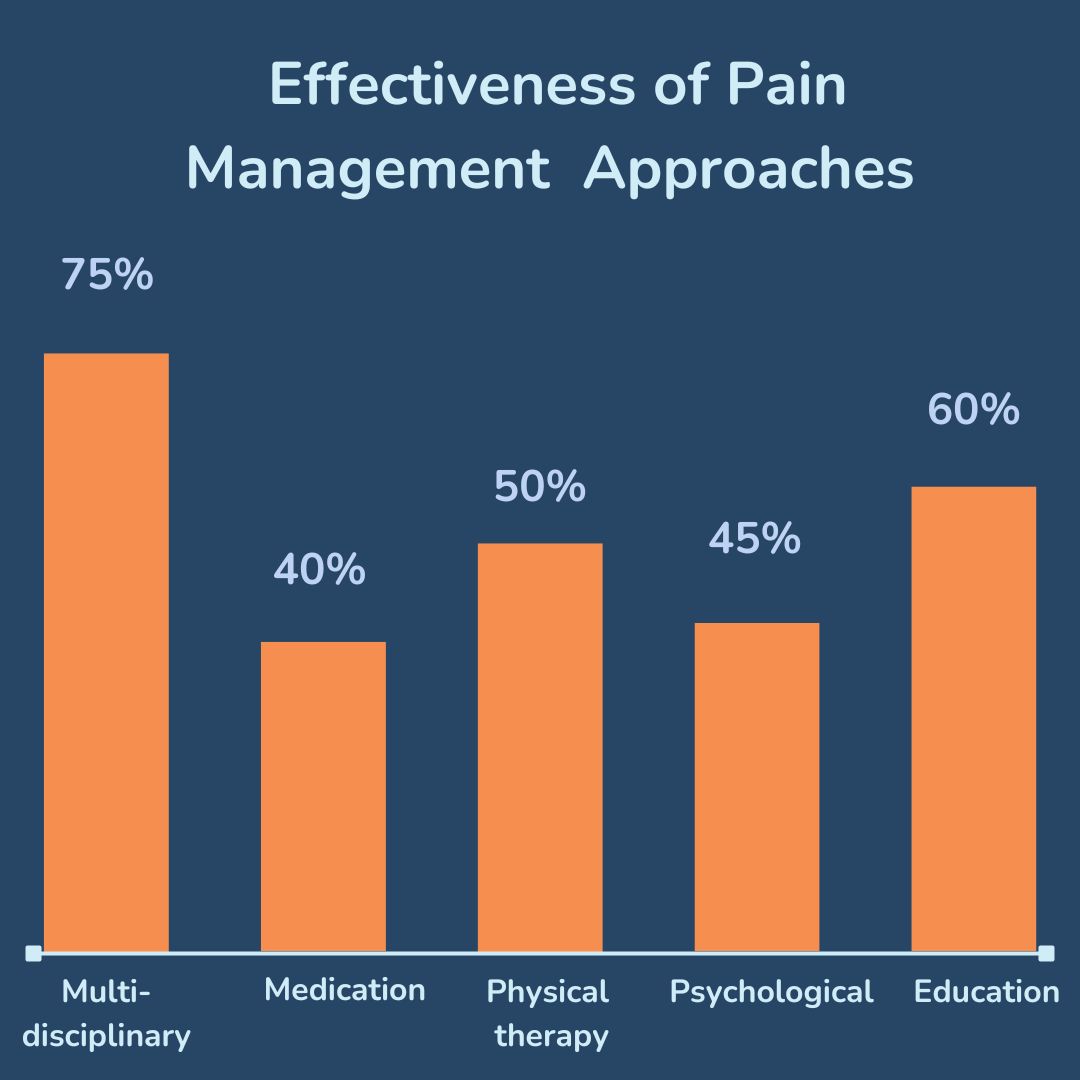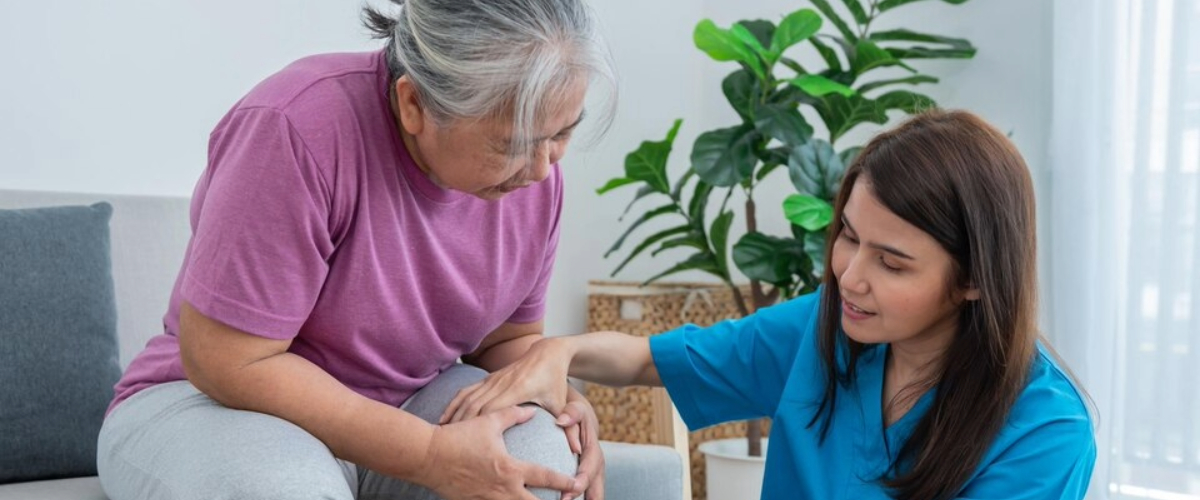Chronic pain is not just physical. It can affect every part of life, impacting your sleep, mobility, and ability to socialize. To live the life you once enjoyed, we are sharing some effective tips that will help you manage chronic pain easily.
Tips to Managing Chronic Pain in the Elderly:
Here are the top 8 essential tips for managing chronic pain in the elderly:
1. Assess Your Pain Intensity:
Before you move toward treatment, you should know how to identify your pain, then according to your pain intensity, you can choose the intervention method required by your body. Assessing pain level is also helpful to those caring for you.
Common tools include the Numerical Rating Scale (NRS), the Verbal Descriptor Scale (VDS), and the Faces Pain Scale-Revised (FPS-R).
- Numerical Rating Scale (NRS): Rate your pain from 0 (no pain) to 10 (worst pain).
- Verbal Descriptor Scale (VDS): Describe your pain with words like “mild,” “moderate,” or “severe”
- Faces Pain Scale-Revised (FPS-R): Point to a face that best matches your pain, from smiling (no pain) to crying (worst pain).
2. Exercise and Physical Activity:
Exercise is considered a natural pain reliever as it helps in improving strength, and flexibility and reduces inflammation. When we exercise, our body releases endorphins which are natural painkillers that help reduce discomfort.
If you have chronic pain, it’s important to start slowly and gradually increase the intensity and duration of your workouts. You can start with low-impact exercises such as walking and yoga.
Talk to your doctor about the best types of exercise for you.
3. Healthy Diet and Nutrition:
Just like our thoughts affect our mood. Similarly, what we drink and eat are directly related. Eat anti-inflammatory foods like nuts, fish, fruits, whole grains, leafy green veggies, and olive oil. Food rich in protein but with no carbohydrates is recommended as carbs intake triggers an inflammatory response in your body. So, avoid processed foods, sugary drinks, white bread, and unhealthy fats.
If we talk about supplements, ginger, and turmeric are the best ones due to their anti-inflammatory properties. You can use turmeric and ginger supplements or take it as natural in the form of ginger tea or your meal.
4. Get Adequate Sleep:
Getting enough sleep can help to reduce stress and improve pain tolerance. Practicing relaxation techniques like deep breathing, meditation, and yoga can help alleviate pain and promote overall well-being. Aim for 7-8 hours of sleep each night.
Read More: 10 Natural Sleep Remedies for the Elderly
5. See Your Doctor to Manage Chronic Pain:
It’s important to see your doctor regularly to monitor your chronic pain and make sure that your treatment plan is working. Your doctor may also be able to prescribe prescription pain relievers or other medications if needed.
Get Arthritis Care for Your Loved Ones!
6. Non-pharmacological Methods:
Managing chronic pain with medication is not the only option. We understand that it’s difficult to bear and manage the pain, but you can also treat it with:
1. Gentle Exercise & Physical Therapy: Activities like yoga, stretching, or tai chi help strengthen muscles and increase flexibility, making it easier to manage pain and stay active.
2. Heat & Cold Therapy: Applying warmth to sore muscles can ease tension, while a cold pack helps with inflammation and provides soothing relief.
3. Massage & Acupuncture: These hands-on therapies not only relieve muscle pain but also promote relaxation, reducing both physical and mental stress.
4. Mind-Body Practices: Practices like deep breathing, meditation, and mindfulness calm the mind, reduce stress, and help you feel more in control of pain.
5. Diet & Supplements: Adding anti-inflammatory foods to your meals and considering supplements like omega-3s can support your body’s natural ability to fight pain.
6. Cognitive Behavioral Therapy (CBT): This approach teaches you new ways to think about pain, making it easier to cope with everyday challenges and maintain a positive outlook.
From this graph you can get an idea of how effective these therapies can be:

Get a Compassionate Live-in Care for Pain Management at Home!
7. Get Support from Family and Friends:
Having a strong support system is important for seniors living with chronic pain. Talk to your family and friends about your pain and try to divert your attention from pain meanwhile, it is crucial to follow the prescribed dosage and schedule.

Helping the Elderly Managing Chronic Pain:
At ConsideraCare, our caregivers play a vital role in supporting seniors who suffer from chronic pain. We suggest the following tips for providing effective and compassionate care:
- Show empathy and provide emotional support to help seniors deal with the difficulties of chronic pain.
- Promote a healthy lifestyle by helping with meal preparation, accompanying during physical activity, and ensuring adequate sleep.
- Facilitate daily activities, such as household tasks, personal hygiene, and mobility assistance, to avoid pain triggers and enhance comfort.
Final Thoughts:
Managing chronic pain in the elderly requires a multi-faceted approach that encompasses lifestyle modifications, pain management techniques, professional interventions, and support from caregivers & family members. This approach has proven to be the most effective.
By implementing the strategies and tips outlined in this blog post, seniors can regain control of their pain while improving their overall quality of life. Remember, it is essential to collaborate with home care providers to develop personalized pain management plans that cater to the unique needs of each individual.
Want to learn more?
Reach us at wecare@considracare.com, or call us at 1-855-410-7971, and we will be happy to assist. Discover more tips in our information booklets or on our resources page.
FAQ’s:
1. What are the most common causes of chronic pain in the elderly?
The most common causes of chronic pain in the elderly include arthritis, neuropathy, musculoskeletal disorders, and past injuries. Other causes may include chronic headaches and post-surgical pain.
2. What are some tips for seniors to get enough sleep despite chronic pain?
Getting enough sleep is important for everyone, but it is crucial for seniors with chronic pain. Here are some tips for seniors to get enough sleep:
- Establish a regular sleep schedule and stick to it as much as possible.
- Avoid caffeine and alcohol before bed.
- See a doctor if you have trouble sleeping despite following the above tips.
3. How is chronic pain in the elderly managed by healthcare providers?
Healthcare providers manage chronic pain in the elderly through various medical interventions, such as medications, injections, nerve blocks, surgery, physical therapy, and occupational therapy. The specific approach depends on the patient’s unique needs and underlying causes.
4. What are some non-medication pain management techniques that seniors can use?
There are a number of non-medication pain management techniques that seniors can use, such as:
- Heat and cold therapy
- Massage
- Yoga
5. What are the 5 A’s of chronic pain?
The 5 A’s of chronic pain management are:
- Analgesia: Providing relief from pain through various methods such as medications or therapies.
- Activities of daily living (ADLs): Focusing on maintaining or improving the patient’s ability to perform everyday tasks despite chronic pain.
- Adverse effects and aberrant drug-related behaviors: Monitoring and addressing any negative consequences or unexpected behaviors associated with pain management medications.
- Affective distress: Recognizing and addressing the emotional and psychological aspects of chronic pain, as they play a crucial role in its perception and management.
- Adaptation: Encouraging patients to adapt to and manage their chronic pain by incorporating lifestyle changes, coping strategies, and therapeutic interventions.






